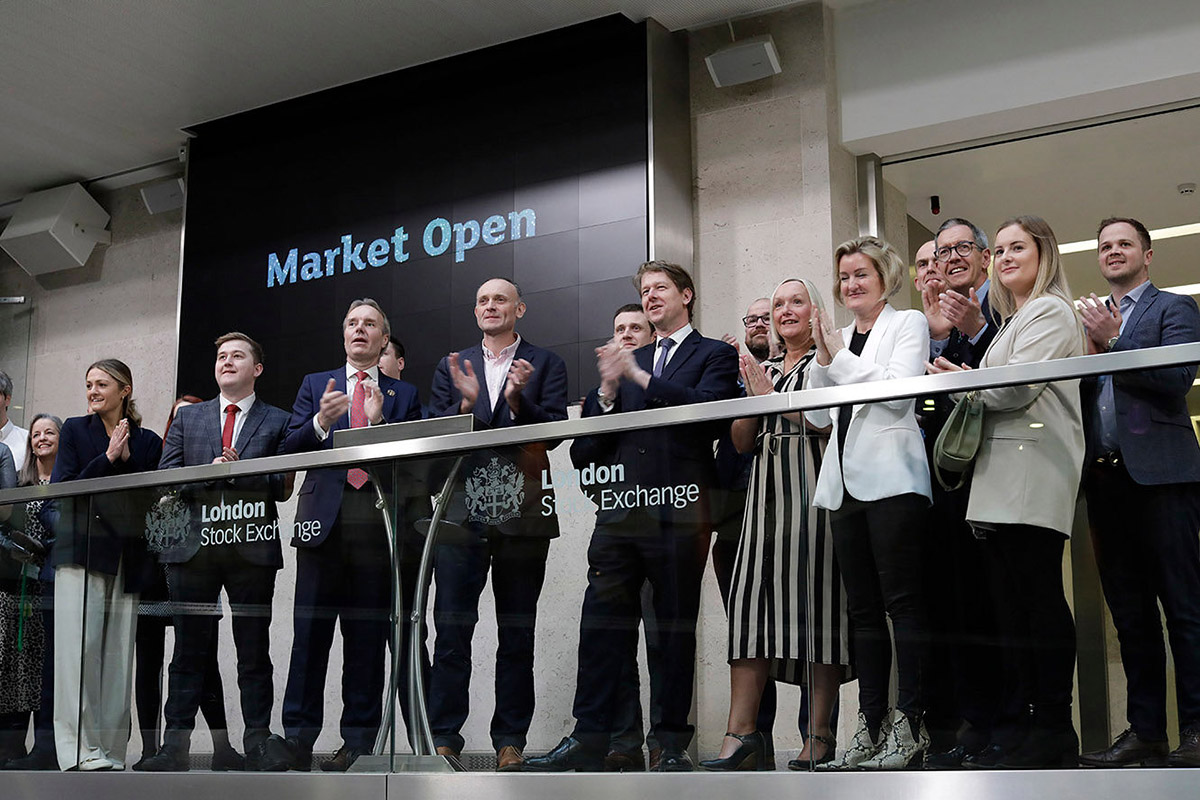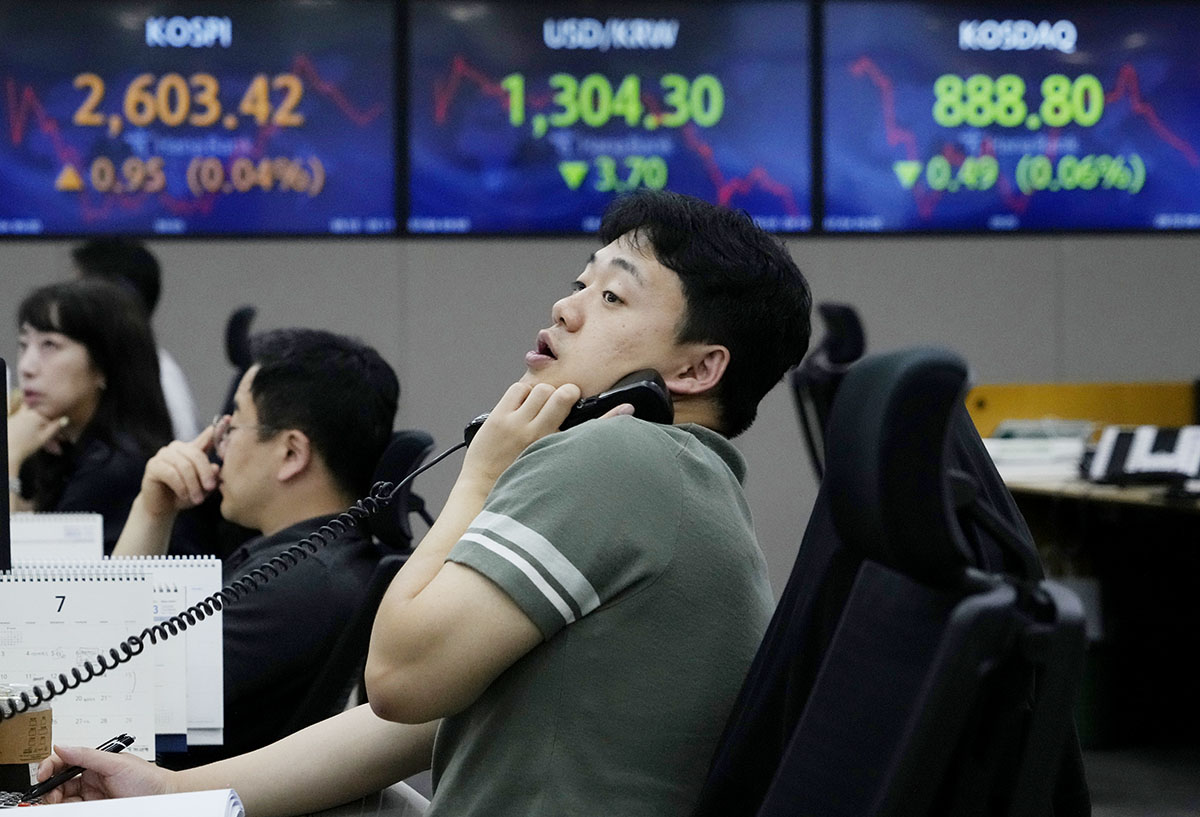

Finance
What Time Does UK Stock Market Open
Modified: February 21, 2024
Discover the opening hours of the UK stock market and stay up-to-date on finance trends. Find out what time the market opens and plan your trading strategy accordingly.
(Many of the links in this article redirect to a specific reviewed product. Your purchase of these products through affiliate links helps to generate commission for LiveWell, at no extra cost. Learn more)
Table of Contents
Introduction
Welcome to the world of stock trading in the United Kingdom! Whether you are a seasoned investor or just starting out in the exciting world of finance, understanding the trading hours of the UK stock market is crucial. Timing is everything in the stock market, and being aware of when the market opens and closes can greatly influence your investment decisions.
The UK stock market is one of the largest and most significant financial markets in the world. It provides a platform for companies to raise capital and investors to buy and sell shares of publicly traded companies. The market is regulated by the Financial Conduct Authority (FCA) and operates with efficiency and transparency.
Trading hours for the UK stock market are set in order to accommodate both domestic and international investors. These hours have evolved over time to meet the demands of a globalized financial landscape and ensure that market participants have ample opportunities to trade.
In this article, we will delve into the trading hours of the UK stock market, including the opening and closing times, as well as pre-market and post-market trading sessions. Understanding these timings will empower you to make informed decisions about buying and selling stocks, maximizing your investment potential.
The UK Stock Market: An Overview
The UK stock market, also known as the London Stock Exchange (LSE), is a hub of financial activity where equity shares of public companies are bought and sold. It is comprised of various indices, with the most prominent being the FTSE 100, which includes the largest 100 companies listed on the LSE based on market capitalization.
Companies listed on the UK stock market span a wide range of industries, including finance, technology, healthcare, energy, and more. The market provides a vital source of capital for businesses, enabling them to expand operations, invest in new projects, and fuel economic growth.
The UK stock market operates under a well-regulated framework to ensure the integrity and fairness of trading activities. The Financial Conduct Authority (FCA) oversees the market, enforcing rules and regulations to maintain market stability and protect investors’ interests.
Investors can participate in the UK stock market through various channels, including online trading platforms, traditional brokerage firms, and investment funds. The market offers opportunities for both long-term investors who seek to hold shares for years and short-term traders who aim to profit from daily market fluctuations.
Key factors influencing the performance of the UK stock market include economic indicators, political events, corporate earnings reports, and investor sentiment. Understanding these factors is crucial for investors to make informed decisions and manage risks effectively.
The UK stock market is known for its liquidity and high trading volumes, attracting both domestic and international investors. It provides a platform for investors to diversify their portfolios, gain exposure to different sectors and regions, and potentially earn attractive returns.
Throughout its history, the UK stock market has proven to be resilient, withstanding economic downturns and geopolitical uncertainties. However, it is important to remember that investing in stocks involves risks, and past performance is not indicative of future results. It is essential to conduct thorough research, seek professional advice, and assess your risk tolerance before engaging in stock market activities.
Now that we have a broader understanding of the UK stock market, let’s delve into the specific trading hours and sessions that govern its operations.
Trading Hours of the UK Stock Market
The UK stock market operates Monday through Friday, with the exception of public holidays. It is important to note that the trading hours may vary during certain holidays or special events. The trading day is divided into several distinct sessions, including the regular market hours, pre-market trading, and post-market trading.
The regular market hours for the UK stock market are from 8:00 AM to 4:30 PM local time, also known as the “core trading hours.” During this time, investors can actively buy and sell shares on the various indices and exchanges within the UK stock market.
Pre-market trading, also known as early morning trading or pre-market session, allows investors to place orders before the regular market hours. This session starts at 7:00 AM and runs until the official market open at 8:00 AM. Pre-market trading provides an opportunity for investors to react to news releases, earnings reports, or other market-moving events that occur outside of regular trading hours.
Post-market trading, also known as extended hours trading or after-hours trading, takes place after the regular market hours have ended. This session begins at 4:30 PM and concludes at 5:30 PM. Post-market trading allows investors to continue trading and react to any news or events that may have occurred after the close of the regular market hours.
It is noteworthy that pre-market and post-market trading sessions typically have lower trading volumes compared to the regular market hours. This lower liquidity may result in wider bid-ask spreads and increased volatility. Therefore, it is essential for investors to exercise caution and use limit orders when trading during these extended hours.
Moreover, not all stocks or securities are available for trading during pre-market and post-market sessions. It is advisable to check with your brokerage or trading platform to determine which stocks are eligible for trading during these extended hours.
Understanding the trading hours of the UK stock market is crucial for investors to plan their trading activities effectively and take advantage of opportunities that may arise outside of regular market hours. By being aware of the different sessions and their respective benefits and risks, investors can develop strategies to optimize their trading decisions.
Now, let’s explore the specific opening and closing times of the UK stock market.
Opening Time of the UK Stock Market
The UK stock market officially opens at 8:00 AM local time. This marks the beginning of the regular market hours, during which investors can actively trade shares on the London Stock Exchange (LSE) and other associated exchanges within the UK stock market.
The opening time of the UK stock market is an important moment for investors as it sets the tone for the day’s trading activities. Factors such as news releases, economic data, and investor sentiment can influence the market’s opening prices and subsequent trading patterns.
During the opening minutes of the market, there is typically a period of high volatility as market participants react to overnight news and developments. This can result in significant price movements, presenting opportunities for traders and investors alike.
It is important to note that the UK stock market does not have a pre-market auction or a fixed opening price. Instead, the opening price for stocks is determined through an order matching process that takes place at the beginning of the regular market hours.
As part of this process, buy and sell orders entered by market participants are matched based on the available liquidity and price. This generates the opening prices for each stock, which are then displayed to traders and investors.
While the UK stock market officially opens at 8:00 AM, it is advisable for investors to be prepared well in advance. This includes conducting research, analyzing market trends, and setting up trading strategies based on their individual investment goals and risk tolerance.
Additionally, it is important to have access to a reliable trading platform or brokerage firm to execute trades efficiently and effectively at the market open. This ensures that investors can take advantage of potential opportunities that may arise as the market opens.
By being aware of the opening time of the UK stock market and understanding the dynamics of the market’s initial trading moments, investors can position themselves strategically and make informed trading decisions.
Now that we understand when the UK stock market officially opens, let’s explore the concept of pre-market trading and its implications for investors.
Pre-Market Trading in the UK Stock Market
Pre-market trading, also known as early morning trading or pre-market session, refers to the period before the regular market hours when investors can place orders to buy or sell stocks. In the case of the UK stock market, pre-market trading starts at 7:00 AM local time and continues until the official market open at 8:00 AM.
Pre-market trading provides a valuable opportunity for investors to react to significant news releases, earnings reports, or other market-moving events that occur outside of regular trading hours. It allows them to adjust their investment strategies or execute trades in anticipation of the market’s opening.
While pre-market trading is available in the UK stock market, it is important to note that this session typically has lower trading volumes compared to the regular market hours. As a result, the bid-ask spreads may be wider, and price movements can be more volatile due to lower liquidity levels.
It is worth mentioning that not all stocks or securities are eligible for pre-market trading. The availability and trading activity may vary depending on the specific stock and the trading platform or brokerage used. Some stocks may have limited liquidity during pre-market hours, making it more challenging to execute trades at desired prices.
Investors should also be aware of the risks associated with pre-market trading. The lack of liquidity can result in price gaps between the previous day’s closing price and the opening price of the regular market session. Additionally, the market can be more sensitive to news and events during this time, leading to larger price swings.
To participate in pre-market trading, investors need to have access to a trading platform or brokerage firm that supports this functionality. They should also familiarize themselves with the rules and limitations imposed by their chosen platform to make informed trading decisions.
Overall, pre-market trading in the UK stock market offers an additional avenue for investors to capitalize on early market-moving events and potentially gain an edge in their trading strategies. It is a time when informed investors can react promptly to news and position themselves strategically for the regular market session.
Now that we have explored the concept of pre-market trading, let’s move on to the closing time of the UK stock market and its implications for investors.
Closing Time of the UK Stock Market
The closing time of the UK stock market signifies the end of the regular market hours and marks the completion of a trading day. In the UK, the stock market officially closes at 4:30 PM local time. However, it is important to note that post-market trading continues for an additional hour after the market’s official close.
The closing time of the UK stock market is a crucial period for investors as it allows them to finalize their trading activities for the day and assess the performance of their investments. It is during this time that the final prices for stocks and indices are determined, reflecting the last trades executed for the day.
The closing price of a stock is determined through an order matching process, where buy and sell orders are matched based on the available liquidity and price. Once the matching process is completed, the closing prices for each stock are established.
Investors use the closing time to review their portfolios, evaluate market trends, and make decisions regarding their holdings. They may assess the day’s performance of their stocks, analyze market indicators, and adjust their investment strategies accordingly.
It is important to note that post-market trading, also known as extended hours trading or after-hours trading, takes place after the regular market hours have ended. This session starts at 4:30 PM and concludes at 5:30 PM. During this time, investors can continue trading and react to any news or events that may have occurred after the close of the regular market hours.
Post-market trading sessions typically have lower trading volumes than the regular market hours, and the bid-ask spreads may be wider. It is important for investors to exercise caution and use limit orders when trading during this extended hours session to mitigate potential risks associated with lower liquidity.
The closing time of the UK stock market is also essential for traders who employ various strategies such as day trading or swing trading. They closely analyze the market’s behavior in the final moments of trading to evaluate their trades and plan for the next trading day.
Understanding the closing time of the UK stock market allows investors to assess the daily performance of their investments, make informed decisions, and plan their trading activities effectively. It provides a valuable opportunity to reconcile market activities and ensure that portfolios are aligned with investment goals.
Now that we have explored the closing time and post-market trading hours of the UK stock market, let’s wrap up our understanding of the market’s trading sessions.
Post-Market Trading in the UK Stock Market
Post-market trading, also known as extended hours trading or after-hours trading, is the period that occurs after the regular market hours have ended. In the case of the UK stock market, post-market trading starts at 4:30 PM and concludes at 5:30 PM local time.
This extended hours session allows investors to continue trading and react to any news or events that may have occurred after the close of the regular market hours. It provides an opportunity to capitalize on market-moving information that may impact the prices of stocks and indices.
It’s important to note that post-market trading sessions typically have lower trading volumes compared to the regular market hours. This lower liquidity can result in wider bid-ask spreads and increased volatility. As a result, it is essential for investors to exercise caution and use limit orders when trading during this extended hours session.
During post-market trading, investors can place orders to buy or sell stocks, similar to regular market hours. However, it is worth mentioning that not all stocks or securities may be available for trading during this session. The availability and activity may depend on the specific stock and the trading platform or brokerage used.
Post-market trading provides an opportunity for investors to react to news and events that occur after the regular market hours. For example, earnings reports released after the market close or late-breaking news that can impact stock prices can be responded to during this time period.
It is important to note that the prices of stocks during post-market trading hours can differ from the closing prices of the regular market session. This is due to the lower liquidity and potentially less trading activity during this extended hours session.
Investors who participate in post-market trading should be aware of the potential risks. The lower liquidity can result in wider price spreads, and the market can be more sensitive to news and events, leading to larger price swings.
It is also crucial for investors to be familiar with the rules and limitations imposed by their trading platform or brokerage for post-market trading. The availability of trading features and the list of eligible securities may vary among different platforms.
Post-market trading in the UK stock market provides an additional opportunity for investors to react to late-breaking news and events that can impact stock prices. By understanding the dynamics and risks associated with this extended hours session, investors can make informed decisions and potentially capitalize on market opportunities.
Now that we have explored the concept of post-market trading, let’s summarize our understanding of the UK stock market’s trading sessions.
Conclusion
Understanding the trading hours of the UK stock market is vital for investors looking to navigate the world of finance and make informed investment decisions. The UK stock market operates with efficiency and transparency, providing a platform for companies to raise capital and investors to buy and sell shares.
The regular market hours of the UK stock market are from 8:00 AM to 4:30 PM, during which investors actively participate in buying and selling stocks. Pre-market trading starts at 7:00 AM, offering an early morning session for investors to react to news and events before the market officially opens. Post-market trading extends from 4:30 PM to 5:30 PM, allowing investors to continue trading and responding to developments that occur after regular market hours.
Pre-market and post-market trading sessions typically have lower liquidity and increased volatility compared to regular market hours. It is important for investors to exercise caution and use limit orders during these extended hours to mitigate risks associated with wider bid-ask spreads.
By being aware of the opening and closing times, as well as the availability of pre-market and post-market trading, investors can strategically plan their trading activities. They can react to market-moving events, evaluate the performance of their investments, and adjust their strategies accordingly.
However, it’s essential to note that investing in the stock market involves risks and thorough research should be conducted. It is advisable to seek professional advice and assess your risk tolerance before engaging in stock market activities.
In conclusion, understanding the trading hours of the UK stock market empowers investors to make timely and well-informed decisions. By staying informed about market dynamics and utilizing the available trading sessions effectively, investors can potentially capitalize on opportunities and navigate the dynamic world of stock trading in the United Kingdom.














